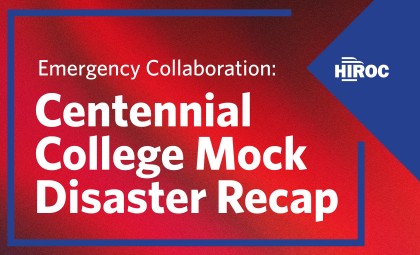Emergency Collaboration: Centennial College Mock Disaster Recap

As the old saying goes, “We don’t rise to the level of our expectations. We fall to the level of our training.”
On February 28, Centennial College in Scarborough, Ont., became a stage for a major event aimed at preparing future first responders and healthcare professionals for a worst-case scenario.
Students training to be firefighters, paramedics, nurses, and police officers collaborated with several HIROC Subscriber participants coming from Michael Garron Hospital, Scarborough Health Network, Royal Victoria Regional Health Centre, Sunnybrook Health Sciences Centre, Ornge, Oak Valley Health, and many others.
As these participants know, emergencies have a way of arriving unannounced, so they were highly enthusiastic about using this day to put their preparedness and response to the test.
“You’ve got a group of strangers here who’ve come together and organized to solve an incredibly chaotic, seemingly impossible task,” said Laurie Mazurik, Staff Emergency Physician at Sunnybrook and Critical Care Transport physician at Ornge, and organizer of the mock disaster event.
“Being able to do something like this with this many people makes a big difference in our community. It’s uplifting.”
With HIROC’s steadfast belief in the power of practicing your plans and our dedication to ensuring healthcare organizations are ready for any eventuality, a number of HIROC experts were on-site to both help facilitate the mock disaster simulation and offer a unique lens.
Lori Borovoy, HIROC’s Senior Healthcare Risk Management Specialist, supported the mock disaster’s Emergency Operations Centre (EOC) with updates and injects as the day unfolded, while Queenie Huang, Healthcare Risk Management Coordinator at HIROC, served as a scribe, documenting the evolving scenario.
“The participants in the Emergency Operations Centre exercise demonstrated remarkable teamwork, quick thinking, and exceptional problem-solving skills, making the practice experience wonderful,” said Borovoy.
As a communications professional and co-chair of HIROC’s Resilience Committee alongside my colleague Lori, I also had the privilege of being on-site to not only report on what took place, but also assist the EOC’s Media Relations designate in preparing for a press conference scheduled at the event’s conclusion.
An Ice Storm Blankets “Centennial City”
The scenario was as intricate as it was challenging—Centennial College transformed into Centennial Health Science Centre, which was thrust into disarray by a recent ice storm. The hospital, being the largest in the area, faced power outages, heat loss, impassable roads, and an eventual roof collapse.
With a mix of tabletop scenario script injects, live updates from the emergency department, the mock Municipal EOC, and other internal and external agencies, participants in the EOC were tasked with navigating the hospital through a Code Orange.
As soon as the scenario began, the hospital EOC was buzzing with activity. Participant’s roles in the EOC ranged from Incident Manager to Patient Flow, and they not only had to manage the hospital’s internal challenges, but also coordinate with 911 dispatch, EMS, Ornge, Fire, and more. Mimicking real life, the scenario brought forth the urgency of the situation as incidents occurred, and worried families sought information about their loved ones.
Why Your Organization Should Use Tabletop Exercises
“These events are helpful because of the unique perspectives everyone brings,” said Siobhan Pickering, Emergency Preparedness Specialist at Michael Garron Hospital.
“It’s group problem-solving in a scenario that could be real, but thankfully isn’t at the time. So, you can make mistakes, go over things, and work out if you have something in place already at your organization to help in an actual situation.”
Simulations like these serve as a bridge between theory and reality, allowing participants to hone their skills in a controlled yet dynamic environment. They’re more than just a training exercise—they’re a demonstration of resilience and teamwork and a shining example of proactive risk management in action.
“One thing I learned is in complex emergencies, collaboration and relationship-building is important,” said Elyse Hosein, Emergency Preparedness Specialist at Scarborough Health Network.
“Establishing connections with external agencies is crucial so we are familiar with each other’s processes and can build them into our procedures and plans as necessary. That way, in emergency situations, there are no delays in coordinating response and recovery efforts.”
If you’ve been inspired by this event and are eager to learn more about organizing your own small-scale tabletop simulation, we highly recommend you reach out to our dedicated team of healthcare risk management specialists at [email protected].
By Marc Aiello, Communications and Marketing Specialist
